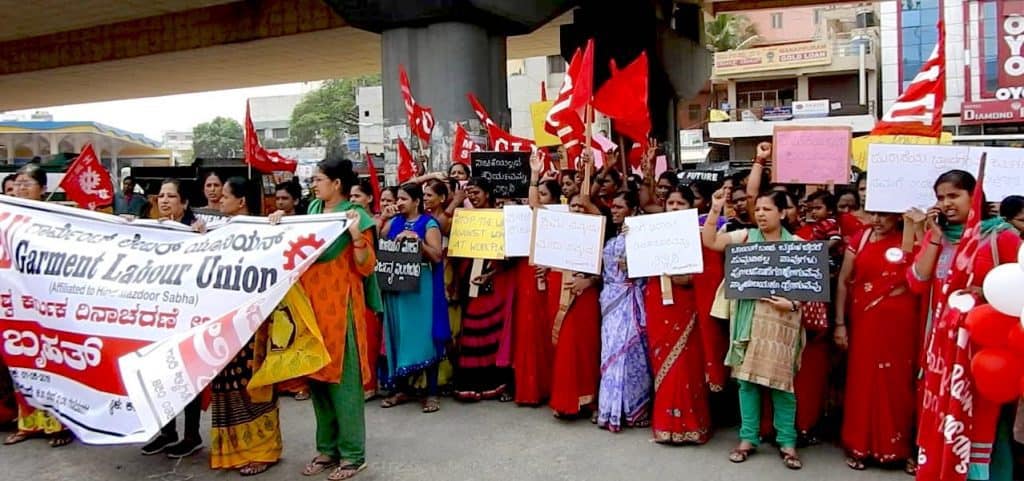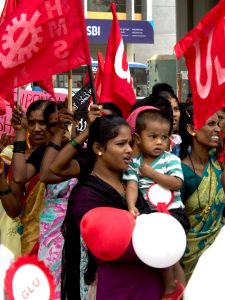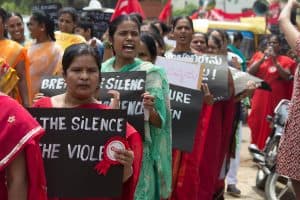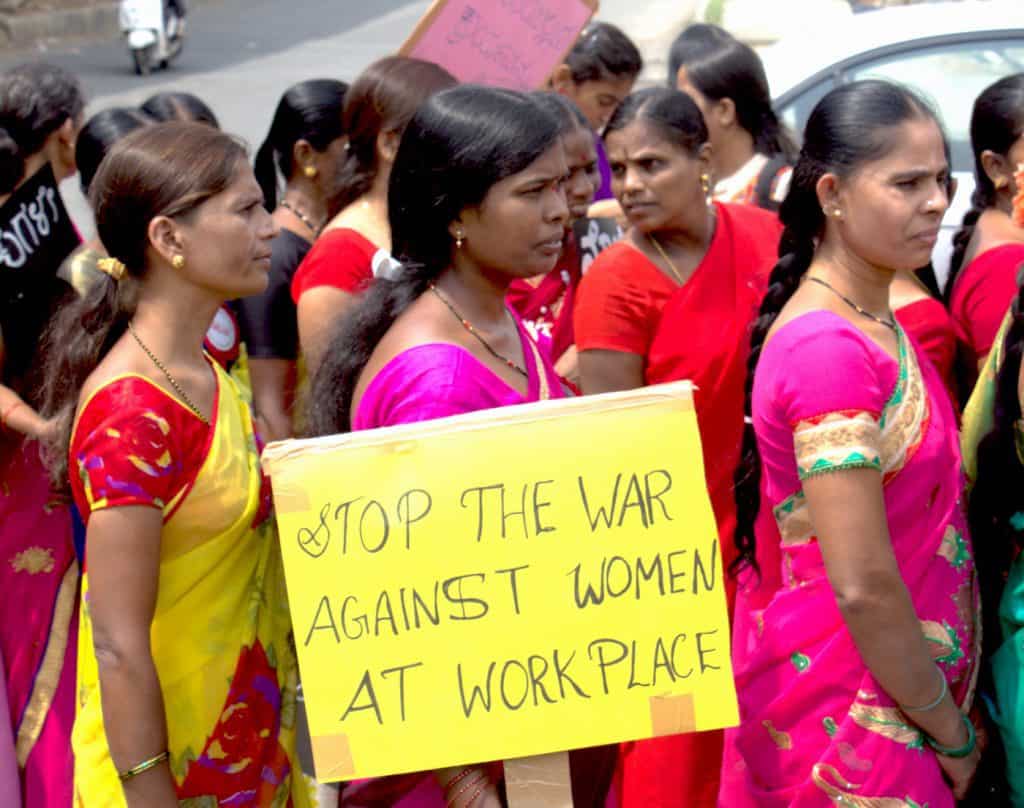Supplying clothing to some of the major global brands, many garment factories have been paying a pittance to their workers. On May Day, Bengaluru’s garment factory workers, 90 percent of whom are women, demanded that companies pay them arrears as per the state government’s draft notification on wage hike last year.
Hundreds of workers, mostly women marched from Kanteerava Stadium to Peenya, demanding action on issues ranging from poor pay, to working conditions to safety. The women held the protest under the banner of the Garment Labour Union (GLU). The union says that the companies in Bengaluru owe Rs 1862 crores to the 4.5 lakh garment factory workers here. Unskilled workers – the majority in the industry – are paid only a meagre Rs 8138 per month currently, including dearness allowance. This category includes helpers, trimmers, housekeepers etc.

PIc: Sujnan Herale
Saroja K, General Secretary of GLU, says that the last time the industry’s minimum wage was revised, was in 2014. “Since then, only dearness allowance has been increased by minuscule amounts every year,” she says. In February 2018, the Siddaramaiah government had issued a draft minimum wage notification, by which unskilled garment workers’ wage would have hiked to Rs 11,587. However, the industry is said to have opposed this, and the notification did not come into effect.
In effect, this meant each worker had been denied Rs 3449 per month – that is, Rs 41,388 over the last year. For the entire workforce of 4.5 lakh workers, the cumulative amount would come to Rs 1862 crores.

PIc: Sujnan Herale
The wages of semi-skilled, skilled and highly-skilled workers is hardly any better than that of unskilled workers. For example, highly-skilled workers earn only Rs 9000-9500, whereas, as per the 2018 draft notification, they should be earning around Rs 14,000, says Saroja. “There is just no women workers in the industry who earn more than Rs 9500, however skilled they are,” she says.
While the industry claims that paying higher wages would be a financial burden on them, according to WTO estimates, labour is only 1-3% of the market price of a clothing item. Workers have been subsidising manufacturers for too long, says GLU.
The union had met the current Chief Minister H D Kumaraswamy, as well as officials in the Labour Department, demanding wage hike last year. Kumaraswamy did set up a committee to decide on the issue as well. “But the committee has met only 3-4 times so far, and there has been no outcome,” says Saroja.
Minimum wages revised only four times in 44 years
Another major contention of the workers is that in the last 44 years of the garment industry in Karnataka, minimum wages of workers was revised only four times overall. “But as per the Minimum Wages Act, 1948, state governments should revise wages every 3-5 years. This means, garment workers’ wages should have been revised at least eight times instead of four,” says Saroja.

PIc: Sujnan Herale
The current wages between Rs 8000 and Rs 9000 is not nearly enough, she says. “About half the wages go towards house rent. In Bengaluru, the rent for a house with just a single room and kitchen, comes to around Rs 4500.”
Saroja says that harassment by supervisors, most of whom are men, is very common in the industry too. “There is sexual harassment, and also harassment alleging low productivity of the worker. Facilities are extremely poor too. For example, 70-80 workers are made to travel in a company bus that can accommodate only 30,” she says. Managements also prevent unionisation so that the workers don’t question them.
Shekhar, a worker in a garment unit says he doesn’t get overtime payments properly. He says “I’ve experience, I question. (Most) workers don’t.”
Minimum wages should be Rs 18,000, says GLU
The union is demanding that wages be paid for now as per last year’s draft notification, and that last year’s arrears of Rs 1862 be paid. However, the minimum wage should be Rs 18,000, they say. This is the minimum wage for a Class D employee of the central government, and should be the minimum for all workers in the country including ASHA workers, sanitation workers, and so on, they say. GLU demands that MPs from Karnataka should push the central government to legalise this.

PIc: Sujnan Herale
A study on the statutory minimum wages and work intensity for garment workers showed that more than 60% of their wages goes into house rent, basic provisions and transport, leaving little for expenses on education and health. Work in garment factories is back breaking and affects women’s health. Their wages are too meagre to save for a rainy day or retirement. But for poor unskilled women, there are few alternatives.
The struggles and issues faced by the Bengaluru’s garment workers still remain largely out of the public eye. Gopika Bashi, a gender justice campaigner who is part of GLU’s support network, points out, “This is not a fight that can be fought alone – workers need support from the media, lawyers, NGOs, and active citizens to amplify their issues in the public domain; to hold the government and companies accountable; and to ‘visibilise’ the violence and discrimination they face.”